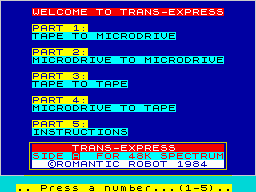In a software series called Trans-Express, Romantic Robot is offering cassette versions of such snappily-named programs as Tape To Microdrive, Microdrive To Microdrive, Tape To Tape and Microdrive To Tape.
From a brief glimpse snatched while visiting this year's Computer Fair, the facilities offered are user-friendly and contain various error- trapping routines and tests to stop you losing your precious code. No doubt, what many buyers will have in mind
So far, there's been little reaction from software houses - perhaps because they've yet to grasp the implications. But, if you're the proud owner of Microdrives and fed up with the amount of software currently available on this medium (ie. none) then this package will allow you to transfer across some of the material you now have on tape. What's the point of having a Microdrive if you're not able to use it? Of course, the software houses may take a different point of view.
Anyone interested in this clutch of programs can contact Romantic Robot direct at nnn xxxxxxx xxxxxx, xxxxxx xxn nxx. The prices are £5.50 each, £7.50 for any two, or £9.95 for the lot.

Pride of place went to the Sinclair Research stand - which resembled a 1980's version of the Greek Pantheon - and there, that still rare bird, the QL, was much in evidence. Keen-eyed visitors on the Business / Trade Only day were treated to a sight of the diminutive Sir Clive moseying round his stand, perhaps in search of some good publicity to support him in his current enthusiasm for taking over as purveyor of the Beeb's official machine.
An interesting addition to this year's binge was the computing junkshop. Two were in evidence, selling a motley array of unwanted secondhand bits and pieces of computing gear. 'Bargains' could be had for just a small sum, albeit the goods lacked any kind of guarantee.
Perhaps the main story of the show was that
According to the Exhibitions Manager of the Computer Fair, Roy Bratt, although the Fair seemed smaller than last year's, it actually covered the same floor space - probably due to there being bigger stands and fewer of them.
Attendance this year was down 20,000 on last year - which could be a trend, especially when you consider that the recent Commodore Fair's attendance was down 10,000 on its previous bash. Encouragement can be gained, however, from the fact that Roy's already got the next Computer Fair well in hand - just wait 'till next year, eh Roy!
